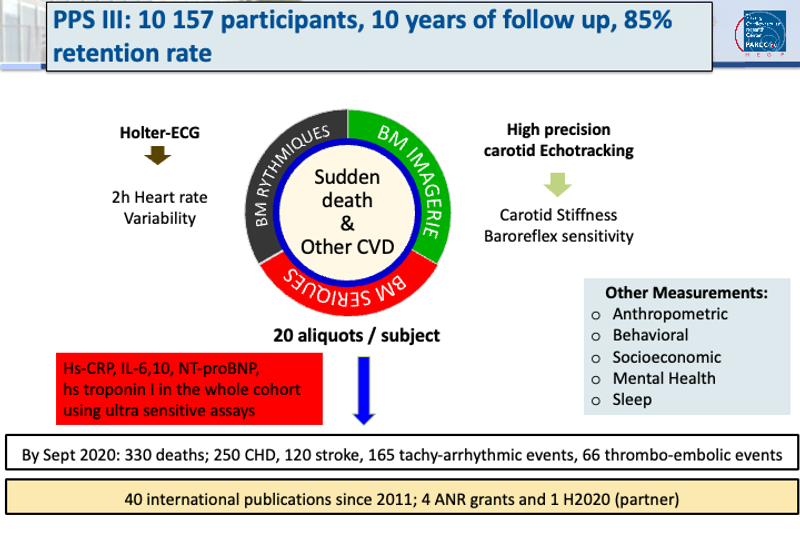The EPP3 Survey (Paris Prospective Survey No. 3) offers an integrative approach which aims to identify new determinants of cardiovascular diseases in adults in the general population. The main determinants evaluated concern heart rate abnormalities, imaging biomarkers of arterial aging, plasma biomarkers, mental health, and sleep-related habits. The cardiovascular pathologies explored are sudden cardiac death, acute coronary syndromes, strokes, rhythm disorders, pulmonary embolism and deep vein thromboses, and arterial emergencies (aneurysms and dissections).
Between 2008 and 2012, 10,157 volunteers (40% women) aged 50 to 75 were recruited during a health check-up carried out in one of the health examination centers financed by social security in Paris. All volunteers signed written consent for participation in this study.
The health check-up at the health examination center: this is a standardized check-up with preventive purposes. Subjects complete socio-demographic questionnaires, on their health behaviors (tobacco, alcohol, physical activity, etc.), on their mental health (questionnaire on depressive symptomatology). They also report their most recent prescription, allowing them to know their medication consumption. They also have a complete clinical examination by a doctor, an examination of their vision and their hearing. A blood test is carried out allowing us to know in real time the usual parameters (glycemia, cholesterol), an ionogram and a blood count (hemoglobin, platelets, etc.).
Specific EPP3 examinations: in addition to the health check, the volunteers had the following examinations:
a) a mini Holter ECG (3 leads) allowing a recording of the heart rate for the duration of the assessment (2h30-3h)
b) a step test consisting of going up and down for 2 minutes at their own pace 2 steps of stairs
c) ultrasound tracking of the right carotid artery at rest: this examination allows non-invasive measurement of arterial aging parameters
d) ultrasound tracking of the right carotid artery immediately after the walking test, with the measurement of the same parameters as at rest
e) the creation of a biobank: 200,000 aliquots of 250 microL each frozen at -80°C at the biological resources center of the Georges Pompidou European Hospital
f) the response to specific questionnaires on their sleep habits: duration of sleep, questionnaire on insomnia (Pittsburgh questionnaire), presence of sleep apnea (Berlin questionnaire), excessive sleepiness during the day (Epworth questionnaire )
Cohort monitoring: monitoring by questionnaire takes place every 2 years to update the health status of volunteers and in particular to identify people hospitalized for a cardiovascular event of interest. The follow-up rate varies from 82% to 89% depending on the follow-ups. As of September 22, 2022, all volunteers have had at least 10 years of follow-up, half of the 12-year follow-up has been completed, and the 14-year follow-up has just started.
Only cardiovascular events for which hospitalization has taken place are validated by a validation committee. As of September 1, 2020, 330 subjects had died, 250 had been hospitalized for a first coronary event, 165 for an arrhythmia, 66 for a thromboembolic event and 29 for an arterial aneurysm.
The figure below summarizes the reviews carried out under EPP3.

A second examination
The INSERM EPP3 team is preparing the implementation of a second examination 12 to 15 years after the first. It will be carried out in the same health examination center and carried out on volunteers who have agreed, after signing informed consent, to be re-examined. We are in the process of resolving the last regulatory aspects and hope to be able to start recruitment this year in 2024. Due to time constraints, the Holter examination and the walking test will not be repeated. However, the rest of the exams will be carried out. In addition to echotracking of the right carotid artery, a high-resolution ultrasound of the radial artery will be performed, making it possible to assess arterial aging in medium-sized arteries. This second examination will allow us to describe the dynamics of arterial aging in large arteries and to analyze its determinants. Ultimately, we will study the predictive power of all of these measures of arterial aging and their changes on the risk of occurrence of cardiovascular pathologies.
Scientific collaboration with the EPP3 cohort
Researchers interested in a scientific collaboration with EPP3 are invited to contact the scientific council via the following address: csepp3.u970@inserm.fr
